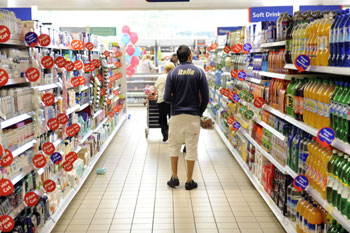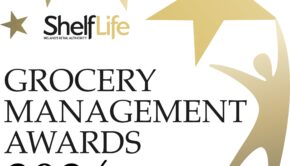Branded for life

Brands are under fire like never before but are the alternatives really what consumers want?
11 September 2009
This push towards private label doesn’t stop with the multiples either.
Own brand lines have become increasingly visible on Ireland’s convenience store shelves. In fact, according to Musgrave, four in five of all grocery shoppers now expect to find own brand products in c-stores.
Subsequently, Centra along with BWG’s Spar have been the chief instigators in drawing own brand battle lines throughout the ongoing grocery price war.
The former has expanded both its mid tier and Rite Price ranges, to offer a total of over 780 lines, while Spar heavily promoted a €1 million investment in own brand earlier this year. This followed a private label volume increase of almost 40% throughout Spar stores in the 12 months to March 2009, and nearly 60% in Eurospar supermarkets. Symbol group brands such as XL Stop and Shop and Londis have also upped their private label credentials, offering the Family Value and Nisa-Today’s own brand ranges respectively.
Winning brands
Retailers have remarked such ranges have provided a useful weapon in helping them compete with the ongoing assault of the discounters. For one retailer, who has discounters literally on his doorstep, brands will always prove a central point of differentiation though.
Noel Dunne owns the award-winning Centra on Parnell Street in inner city Dublin. The street is a veritable hotbed of discounter activity, being the location of choice for Aldi, Lidl and Tesco Express, with new arrival 321 EuroStore nearby. Considering the latter supermarket giant has a left side aisle completely dedicated to Tesco Value at its entrance, one might forgive Dunne for attempting to fight fire with fire.
However, in an area so rich in cut-price private label, brands become a USP. Dunne explains while he stocks approximately 70 or 80 private lines, these are interspersed within each category; the stand exclusively dedicated to showcasing a broad own label range does not appear in his shop. For starters, the store’s city centre location doesn’t grant the necessary space, and in any case, he is "more excited" about Centra’s current "Big Brand Price Cuts" promotion. Brands at a lower price point are what he reckons will entice his customers.
Similarly, Christina Mirt who manages the nearby Costcutter Express on Dorset Street says the only non-branded product it sells is milk, but a lack of private label doesn’t concern her. "It’s not what customers are looking for," she states plainly.
A few doors up, Chris Lynch, who only weeks ago took over the management of Gala Express, Dorset Street, says that in the current climate where "price is king," he is hoping to increase his value brand Homestead range from between 25 and 30 lines, to 50 lines.
Gala currently offers own brand bread and milk, however, he notes, these haven’t lived up to their potential because the store’s previous tenant was selling them at higher than the recommended price. Otherwise, they would have performed "excellently." On whether brands should deep discount to compete in the current climate, he adds this could damage their reputation because "people do associate more expensive with higher quality."
Naturally, this isn’t an issue of immediate consumer concern. "If a can of coke is 99c, customers will want it for 50c," says Sanjay Khan, manager of Larkin’s Spar on Sackville Court. While his store stocks 30 private label lines, which he notes are "good sellers," it’s hard to deny top selling branded goods cut to half-price are the better footfall generator for any store.
Alternative anger
No one would doubt established brands’ cachet within the Irish market. Here, public discord from manufacturers over the likes of Spar Ireland’s online claims that its own lines are "as good as the branded equivalent" have been noticeably thin on the ground. But across the Irish Sea, branded suppliers have vented their anger, albeit anonymously, over more aggressive campaigns such as Sainsbury’s ‘Switch and Save’ and Tesco’s online ‘Cheaper Alternative’ initiative and television ads.
"I thought we had been singled out as some form of punishment for not toeing the line," one supplier claimed in UK trade publication The Grocer. Another CEO of a leading brand thought the push belied the multiples were in trouble. "We are doing well. Evidently they aren’t…It says more about them than it does about us."
Interestingly, Tesco’s Irish domain, Tesco.ie, while displaying some private label variants, doesn’t employ such blatant tactics in order to push its own brand right under the virtual consumer’s nose. Is this because Irish shoppers have traditionally displayed a high degree of brand loyalty?
The six PR-friendly Irish farmer and local producer ‘case studies’ displayed on the website suggest it’s probably because the multiple is preoccupied with promoting its Irish-ness right now. Following the brouhaha surrounding its ‘Change For Good’ programme, this could prove a sage move rather than provoking the ire of suppliers any further.
Irish made
Are foreign own brands denying shelf-space to Irish suppliers though, particularly smaller producers seeking to enter the market? Musgrave has quickly sought to dispel such criticism by emphasising to ShelfLife that its own brand products are largely Irish in origin.
A spokesperson said: "A large selection of Supervalu and Centra own brand products are sourced from Irish suppliers such as Dunhill Cuisine, Irish Yoghurts, Glenisk and Blenders." Likewise, Spar Ireland claims its own brand range comes "from local suppliers, as well as from Spar International and Spar UK." What’s more, Suzanne Campbell, who has written "Basket Case: What’s Happening to Ireland’s Food," claims many Aldi own brand products are Irish produced.
Its meats come from Larry Goodman, its own brand crisps from Largo Foods, its water from the manufacturers of Tipperary Water, and its yoghurts from Irish Yoghurts Ltd in Clonakilty. She adds: "Aldi Flour, which the more jaundiced of you may suspect comes from a monstrous mill somewhere in the Ukraine, is actually Odlum’s Flour."
While there’s a case for arguing own brand can actually potentially benefit certain Irish suppliers, the problem nevertheless remains that an increasing focus on own brand could lead to less choice, and ultimately damage category innovation. Again, Campbell believes this is not necessarily a bad thing because an influx of needless choice is essentially what has driven prices up.
Growing innovation
In any case, according to Mintel, private label doesn’t equate to a dearth of product development anymore. Senior analyst Krista Faron says product innovation is "reaching unprecedented highs. Retailers no longer only launch ‘me-too’ products to compete against major national brands," but are "establishing themselves as trend leaders." In the US, private label foods have accounted for 27% of food introductions so far this year, up from a 13% share in 2005.
On this side of the Atlantic, Spar Ireland has said it is "creating new and innovative products that our customers like and want," but added: "A significant proportion of our volume increase is still attributed to high quality everyday staple products because that’s what our consumers want."
Supervalu and Centra have also "consistently driven innovation." Supervalu introduced new products in its bakery range, including artisan breads and cakes, and variety in its meat offering, from spicy meatballs to barbecue and party packs, and the ‘Just Cook’ range. NPD also led to the Supervalu Cooks Ingredients, Supreme and Centra ‘Good to Go’ ranges.
It is not surprising such offerings are rising in the current economic climate. In the US private label has witnessed upsurges during previous recessions. Chief executive of the Kerry Group, Stan McCarthy is confident traditional brand loyalties will reassert themselves. While Denny and Galtee have lost market share to private label, he has stressed this trend is temporary. "It’s a reflection of a point in time. We need to take a more macro view on the growth in private labels. The market will correct itself over time, with older brands re-establishing themselves."
The macro view
Similarly, Kellogg CEO Dave Mackay claimed in July that private label sales were starting to "moderate." And one of the most outspoken disparagers of private label’s rise has been Reckitt Benckiser chief executive Bart Brecht. Brecht has said RB’s 40% increase in first-half profits indicates consumers still want brands like Dettol, Calgon and Finish.
Spanish retailer Mercadona’s move to get rid of brands was "a complete disaster… Now across Europe people are starting to bring back more branded products," claims Brecht. He points out Lidl Ireland is bringing in more branded products due to consumer demand. Even Marks and Spencer is trialling brands.
Unfortunately for Brecht, days later a survey by price comparison website uSwitch.com announced 73% of UK shoppers were opting for supermarket own brands, compared to 25% last year. Likewise, Nielsen has revealed some unsettling statistics for Irish brands.
Nielsen research indicates that 80% of Irish consumers claim to buy own brand, with 46% claiming to buy more now compared with six months ago. When asked about the reason behind own brand purchases, 78% of those surveyed said "it is cheaper than alternative brands," 71% stated "the quality is just as good" and 45% responded that brand and own label "taste the same."
However, if brands are feeling threatened, they’re unwilling to let it show. Proctor and Gamble told ShelfLife: "Retail brands typically grow in categories where there is little or no innovation. When this occurs, it helps us to work harder and get better by driving our focus on innovation and differentiation, leading to better value for consumers."
Unlike other recessionary periods though, Mintel claims store brands’ greater innovation means private label is here to stay. Likewise, Musgrave has noted changing consumer attitudes mean the own brand consumer is now perceived as a "smart shopper." It remains to be seen if this new face of the grocery sector, heavily made up through own brand, can change once the wind blows back – possibly not until 2011.



 Print
Print






Fans 0
Followers